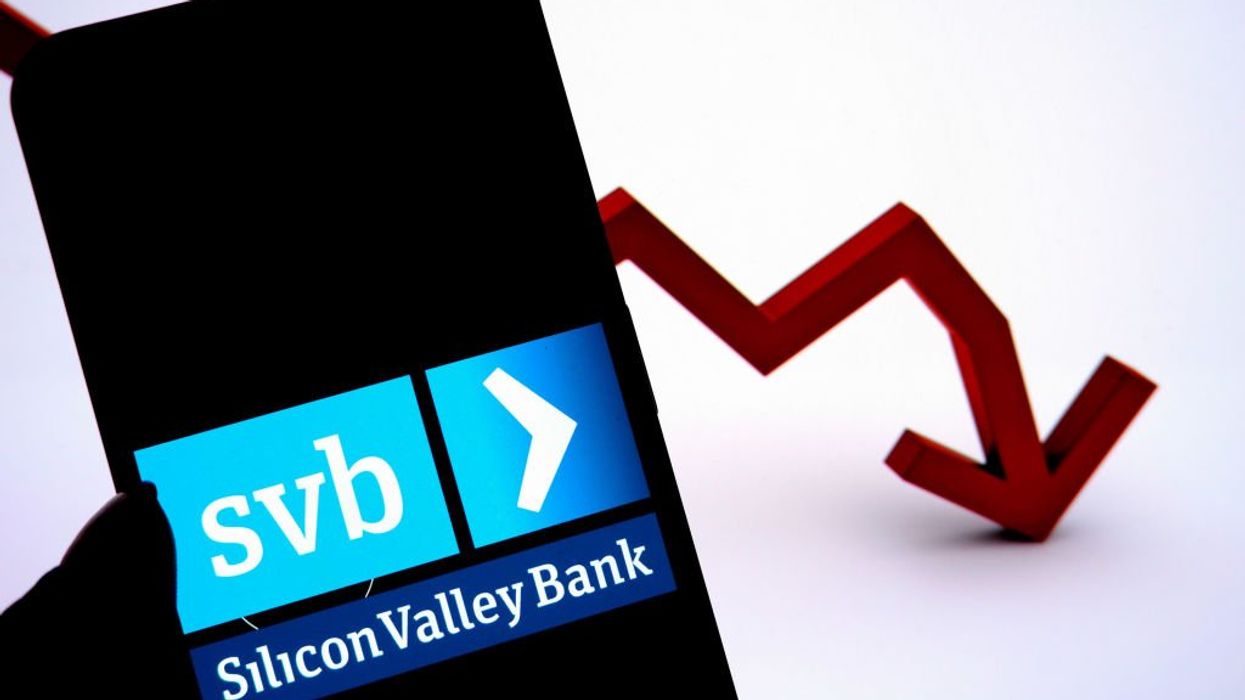
Photo Illustration by Avishek Das/SOPA Images/LightRocket via Getty Images

A California bank that long served tech elites and affluent venture investors collapsed on Friday, amounting to the greatest financial institutional failure since Washington Mutual went bankrupt in 2008.
While Biden officials have suggested that there will not be bailouts comparable to those enjoyed in the late 2000s, the Big Four banks will reportedly see a bailout by another name of roughly $210 billion, while the U.S. government makes wealthy tech workers whole again.
The New York Post reported that Silicon Valley Bank had $209 billion in assets as of Dec. 31, 2022, and was the 16th-biggest bank in the United States. Silicon Valley tech start-ups, venture capital firms, and corporate behemoths deposited at the bank and used its services.
The bank was adversely impacted by the downturn in technology stocks over the past year as well as by the Federal Reserve's endeavor to hike interest rates.
USA Today noted that in recent years, SVB bought billions of dollars' worth of purportedly "risk-free" bonds using depositors' cash. However, the value of these investments has significantly dropped because they now pay lower interest rates as compared to bonds issued today.
Since coastal tech elites and other California customers were hit hard by the downturn, they needed cash. Many began trying to withdraw all at once, prompting SVB to sell off its assets at a loss.
The bank was unable to raise additional capital through outside investors.
Amid liquidity concerns and share losses around $52 billion, regulators shut down the bank Friday, thereby protecting insured deposits and those remaining assets at the bank.
Treasury Secretary Janet Yellen claimed Sunday that unlike the big bank bailouts in 2008, Silicon Valley Bank and Signature Bank — a New York financial institution similarly brought to the brink of collapse last week — will not receive similar treatment in the aftermath of their breakdowns. The U.S. government will, however, reportedly be helping their affluent depositors.
Citing "systemic risk" as justification for extraordinary actions, the Treasury Department, Federal Deposit Insurance Corp., and the Federal Reserve have indicated that they will use the FDIC's insurance funds to prevent tech elites and other depositors in the failed banks from losing money, reported Axios.
"Today we are taking decisive actions to protect the U.S. economy by strengthening public confidence in our banking system. This step will ensure that the U.S. banking system continues to perform its vital roles of protecting deposits and providing access to credit to households and businesses in a manner that promotes strong and sustainable economic growth," wrote Yellen, Federal Reserve Board Chair Jerome H. Powell, and FDIC Chairman Martin Gruenberg in a joint statement.
According to the trio, depositors will have access to all of their money as of March 13. The trio noted that no losses associated with the "resolution of Silicon Valley Bank will be borne by the taxpayer," but rather will be funded by fees on the banks.
Similar action will be used to bolster Signature Bank.
Whereas depositors, characterized in this case by USA Today as businesses and wealthy tech workers, will be protected up to $250,000 each, shareholders and certain unsecured debt holders are on their own.
Extra to these actions, the Federal Reserve indicated Sunday that it will "make available additional funding to eligible depository institutions to help assure banks have the ability to meet the needs of all their depositors."
"The biggest draw of this facility is that banks can borrow funds equal to the par value of the collateral they pledge," wrote Eisen. "This means that the Fed won't look to the market value of the collateral, which in many cases reflect big unrealized losses due to the jump in interest rates."
"That is a boon for banks, who were sitting on some $620 billion in unrealized losses on securities at the end of last year," added Eisen.
Should the banks fail to repay their advances, the Treasury Department, with President Joe Biden's blessing, is promising $25 billion in credit protection to the Fed just in case.
ZeroHedge reported that contrary to Yellen's suggestion, the Big Four banks are effectively getting a $210 billion bailout.
The editorial board at the Wall Street Journal concurred, writing that the guarantees for wealthy California tech magnates' uninsured deposits and the Fed's loans to big banks are together "a de facto bailout of the banking system, even as regulators and Biden officials have been telling us that the economy is great and there was nothing to worry about."
The board noted that the legality of the depositor end of the alleged bailout is unclear, since "Congress set the $250,000 insured limit to protect average Americans, not venture investors in Silicon Valley."
As for the one-year advances, the "Fed is essentially guaranteeing bank assets that are taking losses because banks took duration risk that Fed policies encouraged. This too is a bailout."
"Democrats and the press corps may try to pin the problem on bankers or the Trump Administration, but these are political diversions. You can’t run the most reckless monetary and fiscal experiment in history without the bill eventually coming due," added the board.
Like Blaze News? Bypass the censors, sign up for our newsletters, and get stories like this direct to your inbox. Sign up here!